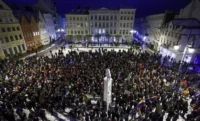
This country’s 16-year-olds voted for the first time. The results are scary
The last time the European Union voted, five years ago, teenagers across the continent were taking to the streets en masse: demonstrating for serious climate protection policies. They had no say, they inveighed, on decisions that would define their lives for years to come. “We’ll go to school if you keep the climate cool”, they taunted with verve, justifying their audacious skipping of class to protest.
Surveys show that young people (usually the 18 to 24-year-old bracket) in democracies on both sides of the Atlantic tend to cast their ballots for more reform-minded, left-of-center parties, rather than those on the right.… Seguir leyendo »















